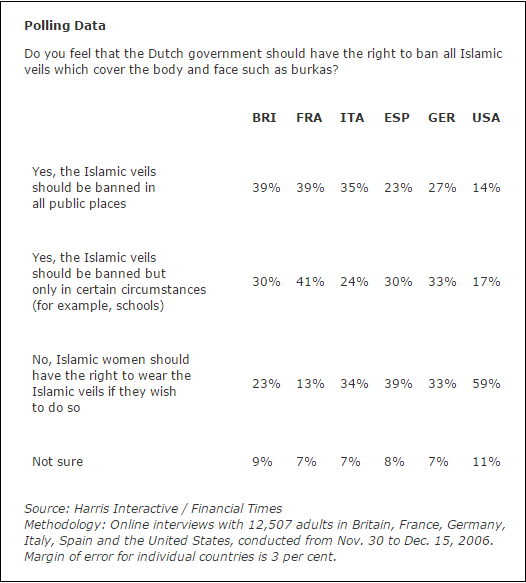When Nora Labrak arrived at a private employment agency last summer near the French city of Lyon, the first question she heard was not about her resume. “I was asked to remove my head scarf at the lobby”, Labrak recalled in a telephone interview. When the 29-year-old refused, she was hustled to the door.
Long or short, sober black or brightly hued, the Muslim women’s head covering is drawing growing objections, and in some places downright hostility, in Europe. It has been banned from public schools in France and Belgium, and its strictest, face-concealing variation, the niqab, has been outlawed in several European towns.
Even in multicultural Britain, the niqab has sparked ferocious debate after the suspension of a Muslim teaching assistant and remarks by Prime Minister Tony Blair on Tuesday that the garment was “a mark of separation”.
“There’s a rise in Islamo-skepticism,” said Franck Fregosi, an expert on Islam at France’s National Center for Scientific Research, referring to the unease many non-Muslims feel about the seeming reluctance of Muslims to be part of the mainstream culture. “There’s a fear and tension that’s installed in certain parts of the population, and I don’t think it bodes well for the future.”
In Brussels, 41-year-old Nicole Thill shares that foreboding. “I haven’t had problems until now, but things are changing,” said Thill, who converted to Islam and began wearing the veil in 2001. “People’s looks are increasingly hostile. And there’s less and less respect. People don’t mind jostling you on the street because, after all, you’re only a veiled woman.”
To be sure, sentiments about Muslims vary widely in Europe. Polls offer a fractured snapshot about how the region’s Islamic community is viewed – and how it views itself. A survey by the Pew Research Center, released in July, found that a majority of European Muslims did not sense hostility from non-Muslims. But a significant number – 39 percent in France, 42 percent in Britain and 51 percent in Germany – reported otherwise.
San Francisco Chronicle, 22 October 2006
Two useful books on the recent attempts to suppress the hijab in Europe are Dominic McGoldrick’s Human Rights and Religion: The Islamic Headscarf Debate in Europe and John R.Bowen’s Why the French Don’t Like Headscarves: Islam, the State, and Public Space.
 Pork soup is back on the menu for homeless people in Paris after a judge ruled it could not be deemed racist.
Pork soup is back on the menu for homeless people in Paris after a judge ruled it could not be deemed racist.
